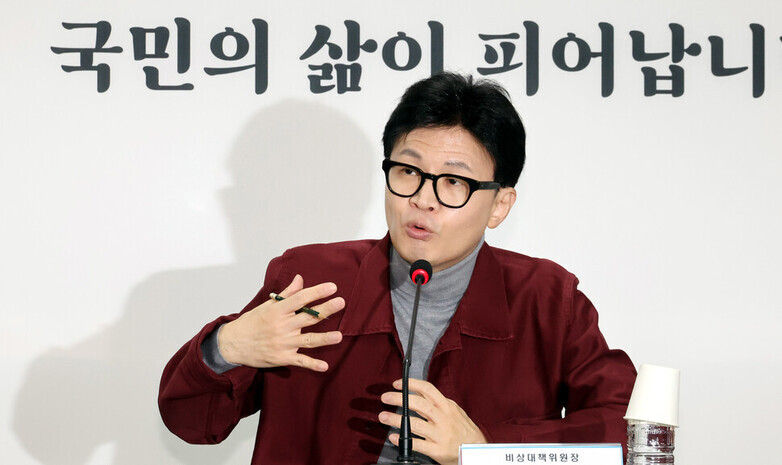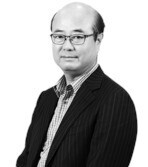hankyoreh
Links to other country sites 다른 나라 사이트 링크
[Column] The tiresome commie witch hunt of Korea’s fake conservatives

South Korea’s Constitutional Court is a product of the June Democratic Struggle of 1987. It emerged through a ninth amendment of the Constitution instituting a direct presidential election system. For the past 37 years since then, the court has contributed to upholding the Republic of Korea and its Constitution.
But there is a darker history behind the Constitution.
The first example of that can be found with the October 2004 decision finding the relocation of the administrative capital unconstitutional. The basis for this was a phantom-like “conventional Constitution.”
This decision by the Constitutional Court has accelerated overconcentration in the greater Seoul area and the destruction of South Korea’s provinces. The executive ended up being split apart.
A second example was the December 2014 decision disbanding the Unified Progressive Party (UPP).
South Korea is a democratic republic. For one of its political parties to be forcibly disbanded, it must have objectives or activities that are in violation of the basic democratic order.
The Constitutional Court could find no such threat in the UPP’s platform, but it dissolved the party anyway, citing similarities between its objectives and activities and those of North Korea. At the time, the front page of the Hankyoreh carried an editorial at the top bearing the title “The death of democracy, the death of the Constitutional Court.”
“The forcible disbanding of a political party will result in severe restrictions on freedoms of political parties and political association, which are crucial elements of a democratic system,” it said. “The political ideas of many people who supported progressive arguments may end up distorted as ‘unconstitutional’ or ‘pro-Pyongyang’ and cast outside the current system.”
Ten years later, those fears are being fully borne out. The ideological attacks that so-called “conservatives” — including People Power Party interim leader Han Dong-hoon — have launched against the Democratic Party and its leader Lee Jae-myung have crossed a dangerous line. They repudiate a core principle of democracy: the coexistence of different values.
The logic behind these arguments has been empty reasoning based on the Constitutional Court’s misguided decision in 2014.
In one of his tirades on Mar. 3, Han said, “Four years ago, even the Democratic Party refused to accept people from the Unified Progressive Party or the Eastern Gyeonggi Alliance. That’s because they were scared of the public. Now it’s the Progressive Party — the latest incarnation of the Eastern Gyeonggi Alliance and UPP — that is participating with a very large stake in a satellite party.”
On Mar. 4, he said, “Yoon Hee-sook, the leader of the Progressive Party — the latest incarnation of Lee Seok-gi’s UPP, which was declared unconstitutional — has said she wants to make it an ‘authorized political party.’ And with Lee Jae-myung making the decision to offer the traditional Democratic Party up as a host for the sake of his own security, those words are no empty rhetoric.”
On Mar. 7, he said, “For the sake of his own survival, Lee Jae-myung has offered up the traditional Democratic Party as a host for pro-Pyongyang forces, including the latest incarnation of the UPP. If this continues, we will end up with successors of the UPP, former spies, and other implicated parties joining the National Assembly.”
And on Mar. 10, he said, “As many pro-Pyongyang forces — who have even been ruled unconstitutional by the Constitutional Court — become members of the National Assembly, they will be able to look into South Korean national secrets without constraints and to interrogate and intimidate our intelligence institutions.”
The so-called “conservative” media have gone even further.
In a Mar. 9 column in the Chosun Ilbo, Gang Cheong-seok wrote, “The Progressive Party emerged out of the UPP, which was forcibly disbanded by a Constitutional Court decision after discussing the need to destroy key domestic infrastructure in the event of a war. The Eastern Gyeonggi Alliance is a catchment area supplying juche advocates who have waged an ongoing campaign to downsize the national military and dismantle the South Korea-US alliance.”
The claims they have made are farfetched and based on leaps of logic. A basic translation of them might read thusly: “The Constitutional Court dissolved the Unified Progressive Party because they were communists. Their successors in the Progressive Party are also communists. In forging an election alliance with the Progressive Party, the Democratic Party and its leader Lee Jae-myung are likewise communists. Don’t vote for communists.”
This applies even if we consider that the Constitutional Court’s decision might have been justified. If a party is dissolved by a Constitutional Court decision, it becomes impossible to form a new party with an identical or similar platform (or basic policies) to the one that was dissolved. This provision in the Political Parties Act bars the formation of “substitute parties.”
If the Progressive Party is indeed the “latest incarnation” of the UPP, that means Han Dong-hoon would need to explain why he didn’t take any action on it when he was the justice minister. If he was remiss in his responsibilities as minister, that would seem to constitute dereliction of duty.
After Korea’s liberation, members of the pro-Japanese collaborators branded many democracy advocates as “commies” and had them executed. This was an ideological maneuver, a ploy to achieve dictatorial rule while covering up their own misdeeds during the occupation.
Their descendants are the ones who present themselves as “conservatives” in the Republic of Korea today. They’re fake conservatives.
It’s quite possible to argue that voters should opt for the PPP and not the Democratic Party. But when you warn people not to vote for the Democratic Party because they’re “pro-Pyongyang,” that’s red-baiting. It’s a communist witch hunt, and it’s a form of violence.
Violence tends to beget violence. How would President Yoon Suk-yeol, Han Dong-hoon, and the PPP respond if someone were to argue that voters shouldn’t vote for them because they’re the descendants of pro-Japanese collaborators — the sort of people referred to by many as “indigenous Japanese pirates”?

Election campaigning is fine, but they should keep a clean conscience.
By Seong Han-yong, editorial writer
Please direct questions or comments to [english@hani.co.kr]

Editorial・opinion
![[Column] Season 2 of special prosecutor probe may be coming to Korea soon [Column] Season 2 of special prosecutor probe may be coming to Korea soon](https://flexible.img.hani.co.kr/flexible/normal/500/300/imgdb/original/2024/0426/3317141030699447.jpg) [Column] Season 2 of special prosecutor probe may be coming to Korea soon
[Column] Season 2 of special prosecutor probe may be coming to Korea soon![[Column] Park Geun-hye déjà vu in Yoon Suk-yeol [Column] Park Geun-hye déjà vu in Yoon Suk-yeol](https://flexible.img.hani.co.kr/flexible/normal/500/300/imgdb/original/2024/0424/651713945113788.jpg) [Column] Park Geun-hye déjà vu in Yoon Suk-yeol
[Column] Park Geun-hye déjà vu in Yoon Suk-yeol- [Editorial] New weight of N. Korea’s nuclear threats makes dialogue all the more urgent
- [Guest essay] The real reason Korea’s new right wants to dub Rhee a founding father
- [Column] ‘Choson’: Is it time we start referring to N. Korea in its own terms?
- [Editorial] Japan’s rewriting of history with Korea has gone too far
- [Column] The president’s questionable capacity for dialogue
- [Column] Are chaebol firms just pizza pies for families to divvy up as they please?
- [Column] Has Korea, too, crossed the Rubicon on China?
- [Correspondent’s column] In Japan’s alliance with US, echoes of its past alliances with UK
Most viewed articles
- 1‘We must say no’: Seoul defense chief on Korean, USFK involvement in hypothetical Taiwan crisis
- 2Is Japan about to snatch control of Line messenger from Korea’s Naver?
- 3[Editorial] Korea’s surprise Q1 growth requires objective assessment, not blind fanfare
- 4Division commander ordered troops to enter raging flood waters before Marine died, survivor says
- 5No good, very bad game for Korea puts it out of Olympics for first time since 1988
- 6Korea’s 1.3% growth in Q1 signals ‘textbook’ return to growth, says government
- 7[Reportage] On US campuses, student risk arrest as they call for divestment from Israel
- 8N. Korean delegation’s trip to Iran shows how Pyongyang is leveraging ties with Moscow
- 9Flying “new right” flag, Korea’s Yoon Suk-yeol charges toward ideological rule
- 10[Column] Park Geun-hye déjà vu in Yoon Suk-yeol